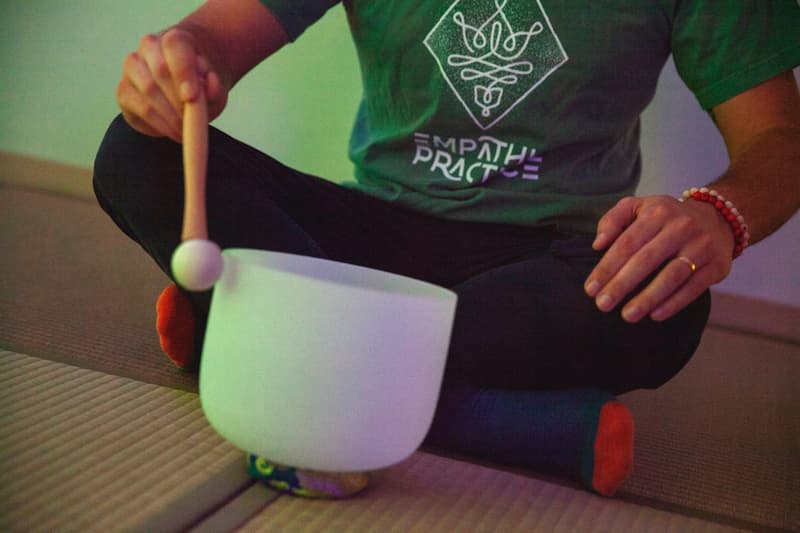What Is The Purpose Of Meditation? Purpose & Meaning & How To Start
The Purpose of meditation depends on what the purpose is of the person practicing meditation. Many people engage in meditation to cope with trauma, to save time and money, or to support them in achieving mindfulness objectives. The goal of mindfulness meditation is to help the mind concentrate on remaining in the present moment.
For more specific information, keep reading.
Table of Contents
What Is The Purpose Of Meditation?
The main objective of meditation is to take pleasure in the procedure. This can be challenging for those who are accustomed to having a clear end goal in mind.
If meditation has any additional objectives, one of them would be to increase mindfulness. Even more specifically, mindfulness meditation is a type of meditation that aims to teach you how to live in the present moment, regardless of how you may be feeling.
Furthermore, mindfulness supports you in accepting those thoughts and feelings as they are, without passing judgment on them or trying to make sense of them.
Just keep in mind that mindfulness is the end result of the practice of meditation.
You can improve your focus, learn to connect better with yourself and others, reduce brain chatter, and lower your stress level by practicing meditation. Although those aren’t the “goals” of meditation, they are advantageous outcomes of mastering how to tune into your body and quiet your mind. On the other hand, mindfulness enables you to discover your true emotions.
What exactly does meditation seek to achieve? Developing this skill and using it in your day-to-day activities.
What Is Meditation, Exactly?
Working with the mind to promote relaxation of the body and mind is what meditation entails. But what exactly does meditation serve? There are many benefits to meditation, such as increased focus, awareness, and calmness. Daily exercise benefits the body, daily meditation benefits the mind. You can maintain a healthy mind by meditating.
The typical meditation technique involves sitting still with your body still and your eyes closed, though many people use different techniques. Although it is not the only method of meditation, mindfulness meditation is one of many that are widely used.
The practice of meditation is becoming more and more well-liked as a means of promoting mental and physical relaxation. Additionally, it has been discovered that meditation can aid in the development of positive emotions and habits as well as a greater awareness of oneself and one’s surroundings.
Where Did Meditation Originate?
Buddhism and Northern India are the origins of meditation. Although there are many different schools of thought, meditation has roots that date back more than 2,500 years.
Although they might not call it “meditation,” it has integrated itself deeply into a wide range of Eastern and Western religions in various ways.” The root of the word itself is a prehistoric Latin word that means “to ponder.”” Since then, people have continued to do it for largely the same reasons, and they continue to do it because, at the end of the day, it really does work.
About The Purpose Of Mindfulness Meditation
Meditation practitioners are aware that inner resources—our own minds and bodies—are where we find happiness and fulfillment in this life, not external sources. To find solutions to your life’s problems through meditation, the majority of its goals, therefore, call for you to turn inward to the mind. Living in the present moment without worrying about the past or the future is made possible by the excellent meditation technique known as mindfulness.

How Does Meditating Feel?
There are many advantages of meditation that occur when one chooses to practice it every day. The ability to hold things in our minds for longer than we would be able to without meditation is one of the best benefits of meditation, which helps us focus better.
It frequently seems like time stands still when you are meditating. When they meditate, many people report feeling energy moving through their body and minds. Even though you might not always notice the changes that meditation makes in your life, others frequently notice the effects of your meditation. See more about How To Solve Your Problems Through Meditation
Why Meditate?
Meditation techniques may still be extremely beneficial to you even if you appear to be completely content, healthy, and calm. Consider ignoring your mind and body the same as ignoring your housework. The same way that dirt, junk, and mess accumulate over time, so too do unfavorable thoughts, feelings, stresses, and anxieties, which can eventually grow and become too much to bear. We can lessen the likelihood of this occurring by putting meditation practices in place. This, however, might come off as a little nebulous and lengthy. What other observable advantages of meditation can you name?
Inner Peace And Calmness
Consider what happens if you ignore your housework for an extended period of time. Garbage builds up, dirt and dust gather, and everything is out of place. Now consider your body to be your house. Every day, a lot of trash is stored in your body, soul, and mind. It could take the form of unfavorable feelings, ideas, or energies. When you don’t practice mindful meditation regularly, this garbage can build up to toxic levels. Stress, anxiety, and depressive feelings can become so overwhelming that they impair your quality of life if they are not dealt with. By instilling a profound sense of calmness and peace of mind, regular meditation can counteract this toxicity. Even just doing this is a very satisfying experience.
The Ability To Abide In The Present Moment
The simple power of being present in the moment is often overlooked. You become present-focused through meditation. You’ll probably become calmer and more collected as a result. Additionally, your self-awareness will grow, making it simpler for you to acknowledge your thoughts, feelings, and bodily sensations without necessarily responding to them. Consequently, you will develop a taste for present-day living.
Positive, anxious, or stressful thoughts about the past or the future are less likely to overtake a mind that is focused on the present. According to studies, practicing mindfulness meditation changes the physical wiring of the brain. While the areas of the brain linked to cognition, happiness, and calmness grow larger, those responsible for anxiety, depression, and difficulty concentrating shrink.
Unlocking The Source Of Inspiration
There are two parts to the active mind: the conscious and the subconscious. Active thought and decision-making are functions of the conscious mind. Long-term memory cannot be stored in it. Instead, it deals with a single idea at a time. It has been proposed that the “conscious mind commands and the subconscious executes.”” Ideas, solutions, and inspiration can come from the subconscious mind. Unlocking joy and creativity from within is a key aim of meditation for some practitioners. In addition to teaching the mind to be impervious to outside distractions, meditation also provides the conscious mind with the tools necessary to observe the mind’s inherent creativity as it manifests itself.
Well-being And Fulfilment
Everyone wants to live a happy, fulfilling life. The majority of us seek happiness from outside factors like relationships, possessions, approval, etc. This may work when things go our way, but when we rely on events outside of our control to make us happy, we’re setting ourselves up to fail because these events are constantly shifting. We experience periods of health and then illness. We receive an award for employee of the month one day, and the following day the business relocates abroad. We experience extreme love swings from one day to the next.
The only real and lasting source of happiness, in the opinion of the highly esteemed meditation instructor and philosopher Trinlay Rinpoche, is within our minds. We can access the mind’s inner wealth through meditation, eliminating our reliance on external circumstances for happiness and fulfillment.
Increased Empathy And Compassion
Meditation is primarily used to develop empathy and compassion in many Buddhist practices. We can learn to treat others with more kindness, patience, and respect by focusing our attention and calming our minds. This concept is tapped into by compassion meditation techniques like Tonglen and Loving-Kindness Meditation, which emphasize developing compassion and love for both oneself and others. Since we can only extend self-care and self-compassion to other people by practicing these behaviors toward ourselves, it is an inherent truth. Isn’t this the best starting point of all goals?
Less Reliance On External Sources Of Happiness
The majority of people seek happiness outside of themselves, often in the form of relationships, wealth, and success. This might work when things go our way. We ultimately set ourselves up for failure when we depend on external factors for our happiness. Over-dependence on outside factors can lead to highly erratic mental and emotional states because external factors are constantly changing. One of meditation’s most advantageous effects is that it encourages us to look within rather than depend on outside factors for happiness. We can become much healthier and happier by focusing on the fulfillment that the mind can offer.
Improved Sleep
Yes, a variety of meditation techniques can result in better sleep. After just one month of regular practice, mindfulness meditation has been shown to lessen depression, fatigue, and sleeplessness. It’s much simpler to get a good night’s sleep when your mind is calmer and less cluttered. However, some meditation techniques might be more effective at addressing any sleep problems you may be experiencing. Check out this article on the top meditative practices for enhancing sleep for more advice on this.
What Distinguishes Meditation From Relaxation?
Because meditation is associated with relaxation, many of us find it appealing. The long-term benefits of meditation practice frequently include a calmer, more level-headed outlook on life, but it’s important to understand that the practice itself is frequently the exact opposite of relaxing. Due to the constant need to focus on your straying thoughts and make an effort to bring them back into focus, participating in a meditation session can be incredibly frustrating. This mental exercise process is anything but soothing.
Is Meditation Really Just For Recharging?
Relaxation is crucial for keeping our capacity to function healthily.
When we experience stress, the sympathetic nervous system activates. Our bodies produce adrenaline and cortisol, which cause stress-related symptoms like sweating, an elevated heart rate, and tension headaches. By lowering the heart rate, regulating our breathing, and diverting our attention from the source of the stress, relaxation techniques try to counter these physiological reactions.
Releasing tension and practicing meditation are not the same thing, it is crucial to remember this. Breathing exercises, yoga, and hypnosis are helpful methods specifically created to reduce stress, and certain activities specific to our personalities (like reading a book or exercising) can also aid in producing a relaxed state of mind.
However, there is a clear distinction between the sense of calm these techniques can produce and the kind of long-term clarity and insight we associate with mindful meditation. We can gain more understanding of how our minds function through this kind of meditation, as was already mentioned. Long-term, dealing with negative thoughts and emotions can be aided by devoting time to mindfulness meditation practice as opposed to passively relaxing. We go into more detail on this topic in our article on why meditation is so much more than just rest.
How To Begin A Practice Of Meditation?
The good news is that you can begin developing your own meditation practice right away if you’re ready to do so. There are only a few things you should be aware of upfront so that you can make plans:
- Make sure that you have a quiet place where you can sit undisturbed for a period of time. You want that area to be serene, safe, and peaceful.
- Setting a deadline at first can be useful. Interestingly, it tends to lower the stakes for the experience. A few minutes at a time, no longer than ten, is helpful for beginners to meditation and mindfulness.
- Pay close attention to your body. You want to make sure that you feel at ease before really getting into the practice. It will be difficult for you to concentrate if you are sitting in a way that makes your back hurt.
- Focus on your breath. Many beginners to the practice find that concentrating on (and even counting) their inhalations and exhalations can help them learn to bring their attention back to their body.
- Keep an eye on your mental activity. There will be mental musings, as well as feelings, that will surface. That is an expected stage of the procedure. Instead of becoming angry or frustrated, identify those thoughts as “thinking,” accept them, and turn your attention back to your breathing.
- Come back to reality slowly. Don’t jump up as soon as your timer rings. Slowly open your eyes and take a moment to notice how you are feeling physically and mentally.
Consider beginning your day or your meditation session with a PYM Mood Chew if you have trouble unwinding or the thought of sitting makes you feel anxious or stressed out. See more about Can You Meditate Lying Down?
What Exactly Is Enlightenment?
For those who practice Buddhism, enlightenment or awakening is the ultimate goal of meditation. This means awakening to the true nature of experience and ending dukkha, or suffering, thus reaching the end of the cycle of death and rebirth.
However, contemporary Western approaches to meditation have diverged from classical Buddhist practices. Different cultural perspectives on life and death are partly to blame for this. Today, many people use meditation as a stress-reduction technique or as a way to alleviate some other kind of suffering rather than as a spiritual practice. Insomnia, hypertension, anxiety, depression, and addiction are just a few examples of the physical, mental, and emotional health problems it can provide a set of tools to help with.
People may believe that the goal of meditation is to disengage from your thoughts and feelings and achieve a lasting state of calm or bliss due to certain conceptions of enlightenment. Actually, meditation is much easier to practice than that.
The End
It is crucial that we dispel the false notion that the goal of meditation is to achieve some kind of eternal bliss, apart from the realities of everyday life. Simply promoting wellbeing and lessening suffering is meditation’s main objective. We can make meditation more fulfilling if we just slightly adjust our expectations.
The separation of thoughts and deeds can be achieved through the use of meditation techniques such as mindful breathing and focusing on physical sensations. Making this space can enhance your interactions with others, lessen regret, increase clarity and intentionality, as well as produce a variety of other positive effects on your physical and mental health.
Finally, I want to thank you for reading!





